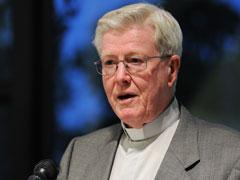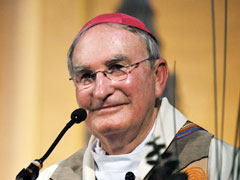Australia: Distances, Demographics, Disaffection Underlie Tales of Resigned Bishops
By Phyllis Zagano
Distances and demographics combine to tell the story. Three-quarters the size of the United States, Australia is mainly uninhabited except along its coastline. While the U.S. shelters close to 313 million people, latest Australian census statistics report only 22 million persons on the continent's nearly 3 million square miles. Australia's Christians -- mainly descendants of 18th-century British settlers and Irish convicts, and of later émigrés from Germany and Italy -- comprise 61 percent of the population. Australia's newest immigrants continue arriving from the United Kingdom and Italy, but also from New Zealand, China, India, Vietnam and the Phillippines. The numbers are impressive: 5.4 million Catholics (25.3 percent of the population) in 33 dioceses and eparchies grouped into five provinces; 175 orders and institutes of men and women religious. Approximately 3,000 priests and 118 deacons join nearly 6,000 religious ministering in 1,369 parishes, hundreds of hospitals, schools, nursing homes and social service agencies. In 2008, Pope Benedict XVI visited the land named by Europeans as Terra Australis de Spiritu Sancto for World Youth Day in Sydney, and welcomed Australians to Rome for the 2010 canonization of St. Mary of the Cross MacKillop. It would seem that Christianity and Catholicism have good footing in Australia. In fact, the 2011 census found the largest "religious" grouping after Catholics is the 22.3* percent of the Australian population reporting "no religion," newly edging out Anglicans and members of the Uniting church, an Australian union of Methodist, Presbyterian and Congregationalists created in 1977. And the largest growth among religious groups is among Hindus, Muslims and Buddhists. Many Australian Catholics who remain -- who have not shifted to "no religion" -- are disaffected and are speaking out. Catholics for Renewal, Catholics for Ministry, Australian Reforming Catholics, and Catalyst for Renewal are among the more active groups, with other pockets of upset operating around the country. Fewer than 200 Australian men are studying for the priesthood, and statisticians contend that within 10 years more than half the priests will be foreign-born -- perhaps not much different when Irish and Scots clergy followed their countrymen, except the new foreign-born are not native speakers of English. Against this backdrop -- more non-Christians, disaffected Catholics, fewer priests and religious -- play out the stories of three resigned bishops: Sydney Auxiliary Bishop Geoffrey Robinson (born 1937), Toowoomba Bishop William Morris (born 1943), and Canberra Auxiliary Bishop Patrick Power (born 1942). All three wanted to talk about the elephants in the episcopal palaces. All three found it rough going. All three resigned, more or quite less voluntarily. Their issues are not peculiar to Australia, and resonate around the world. Each bishop wants them openly discussed. Yet the Vatican's response to suggestions of even discussing married priests, human sexuality, and the ordination of women is automatic. When combined with suggestions about causes of priestly pederasty, or the necessity of general absolution because of sheer distances and numbers, the Vatican's response seems even faster. Robinson was the first to go. A canon lawyer who chaired both the Sydney Archdiocesan Catholic Schools Board and the Australian Catholic Education Commission of New South Wales, for most of his career Robinson was chief justice of the Sydney Archdiocese Marriage Tribunal. He was secretary and then president of the Canon Law Society of Australia and New Zealand. Named an auxiliary bishop in 1984, in 2002 Pope John Paul II asked Robinson to chair a churchwide study on sex abuse. Within two years the task took its toll, and Robinson retired. Since then, Robinson's book Confronting Power and Sex in the Catholic Church: Reclaiming the Spirit of Jesus (Liturgical Press, 2008) was called "a brave exposition" by fellow bishop Power, even as the Australian Catholic Bishops Conference warned against its conclusions. Robinson has been on two speaking tours in the U.S., the most recent in March 2012. He got his largest crowd in Detroit -- 600 people -- after the archbishop let it be known no one should go. Next out the door was Morris, who led the sprawling Toowoomba diocese from 1992 until the pope removed him in 2011. Like Robinson, Morris had gained a reputation for dealing openly with the problem of sexual abuse by priests. In 2006, he declined a summons to Rome faxed on behalf of three Curia cardinals: Giovanni Battista Re, then head of the Congregation for Bishops; William Levada, then head of the Congregation for the Doctrine of the Faith; and Francis Arinze, then head of the Congregation for Divine Worship and the Discipline of the Sacraments. By April 2007, Denver Archbishop Charles Chaput arrived in Toowoomba on behalf of the Congregation for Bishops. The story in Australia is that Morris drove for a day to show Chaput around his 188,208*-square-mile diocese, stopping for an overnight at an outer parish. When Morris intended to drive another day to show more of the diocese, Chaput refused and they returned to Toowoomba. Morris claims he never saw Chaput's report. Morris' missives to the people of Toowoomba paint a different picture from what the Vatican must have seen (and from what Chaput apparently did not want to see). Like many others, the huge Toowoomba diocese faces an exponential priest shortage. The needs of the people and the sheer distances involved caused Morris to defend general absolution, and to wonder in writing if the church should not at least talk about women as priests, and even about recognizing clergy from other Christian denominations. So, Morris got the boot. Most recently, Power took early retirement in June this year. A bishop since 1986 and a leader in interreligious and ecumenical dialogue, Power plainly describes the church's retreat from the promise of the Second Vatican Council (1962-65). For many years he was deeply involved -- even led -- the bishops' conference committee on social justice matters. Five years short of retirement age, he had had it. The case of Power is one of leadership colliding with the leaders. When Sydney Archbishop George Pell was named a cardinal in 2003, Power told The Sydney Morning Herald that Pell was out of touch: "What concerns me is that many of the values that I think are dear to Australian Catholics, such as the dignity of the human person, the primacy of conscience, the theology of communion, the need for dialogue in our church, reading the signs of the times -- I don't think they're values that are particularly clearly enunciated by Archbishop Pell," he said, "and I think for that reason that many people will be disappointed that the church is going further in a direction that is not really catering for their needs." Power's understanding of the discussions echoing throughout Australia -- just this month he joined an interfaith coalition criticizing Pell's denial of climate change -- are often centered on priestly celibacy, church teachings on sexuality and the role of women. Like Morris, Power wants Catholics to talk about these things. He has said the Vatican's "inability to listen" combined with clerical sex abuse and the increasing priest shortage present the church's "most vexing issues." Rome knows full well about the unrest in Australia. A 2011 petition to the pope and the bishops of Australia sponsored by Catholics for Renewal called for synods in every diocese, labeling the church "tainted by injustice and blemished by bad decisions." The petition stated: "We can no longer accept the patriarchal attitude towards women within our Church, and we fear that an extended claim of infallibility is stifling discussion on many important issues." In reply, Adelaide Archbishop Philip Wilson, then president of the Australian Catholic Bishops Conference, said the questions about due process and women's ordination were being referred to the Vatican Congregations for Bishops and for the Doctrine of the Faith. But the Vatican has not answered. Meanwhile, sex abuse and priestly celibacy and women's ordination and human sexuality remain both in the news and in the heart and minds of Australian Catholics, at least it seems among those who have remained.
|
.
Any original material on these pages is copyright © BishopAccountability.org 2004. Reproduce freely with attribution.

